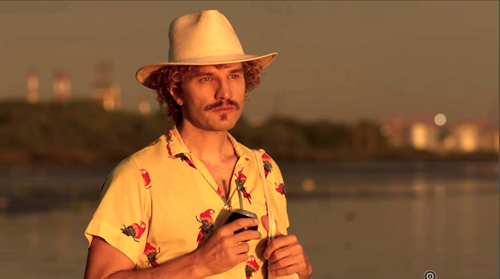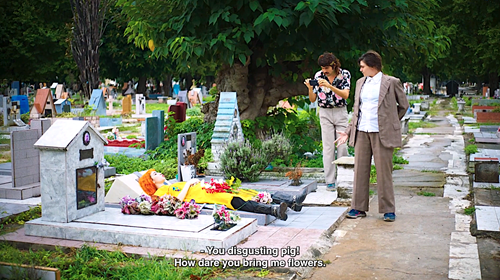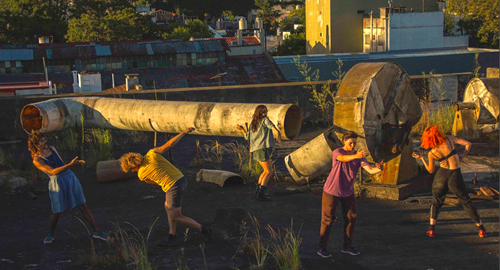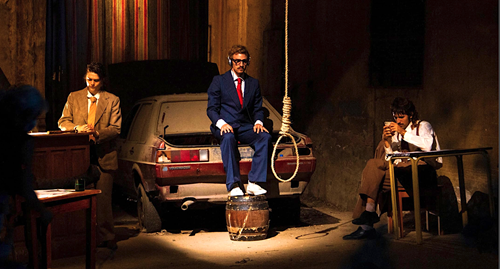
By Robert St. Martin
Argentine cinema knows how to tell stories about foreigners who arrive in the country and face cultural shocks. There is no question that Michael Taylor Jackson’s Underground Orange (Bajo Naranja, 2023) fits in the realm of Borgesian tales that Argentina is known for. Some of you may recall Sebastián Borensztein’s Chinese Take Out (Un cuento chino, 2013), an award-winning comedy of errors that starred Ricardo Darín. In this film written and directed by Michael Taylor Jackson, Jackson himself stars as a naïve American gringo lost in a set of mapcap adventures in Buenos Aires.
A young American (Michael Taylor Jackson), who is called Yanki, arrives in Buenos Aires to visit the grave of Hipólito Bouchard, a 19th century pirate whom he admires. He arrives with only his backpack and goes in search of Bouchard’s tomb in the cemetery. Curiously, this tourist speaks wonderful Buenos Aires Spanish, but that does not prevent him from suffering a series of complications: He is robbed on the street, losing his wallet, I.D., cell phone and passport. He goes to the American Embassy where he does not get any help but is told to come back next Tuesday. So, he ends up sleeping in the cemetery on the grave of the pirate Hipólito Bouchard.

There in the morning, Yanki is discovered by a troupe of theatre performers who are filming a Mexican-style novella in the cemetery with a silly scene using overdone Mexican accents about the death of Frida Kahlo. Paty (Sofia Gala Castiglione), Goya (Bel Gatti) and Dante (Bialuca Zonzini) think that this beleaguered American backpacker might be useful in their current dramatic project being directed by Frida (Vera Spinetta), the head of Bajo Naranja, an independent cultural collective that rejects fascism and capitalism. They live together in an old warehouse that apparently belongs to Frida’s mother. They talk the talk of radicals who reject all forms of fascism and capitalism. Of course, free love seems to be part of their beliefs, but it seems that Frida dotes on Dante the most, but the group worship polyamory. The new American stranger seems attractive to both Paty and Goya.

Given the bleak situation in which Yankee finds himself without any form of I.D or even his cell phone, he is forced to rely on the kindness of strangers. This set of performance artists discover that Yankee can utter fine lines in English from plays and so they decide to use him in their upcoming theatre production. Frida has written a play about how Henry Kissinger when he was Secretary of State under President Nixon jeopardized US efforts to stop mass killings by Argentina’s 1976-83 military dictatorship by congratulating the country’s military leaders for “wiping out” terrorism, according to a large trove of state department files which were declassified in 2017. The play that the group Bajo Naranja are rehearsing needs this Yankee young man to take the part of Henry Kissinger. The play is centered on Kissinger being put on trial for collaborating with state-sponsored terrorism by the U.S. government with the Argentine military dictatorship.

Crazy as the plot of this film may seem, the underlying issues of Argentine politics are real. In some ways, Underground Orange reminds me of Stephen Winters’ Chocolate Babies (1996) – where a group of drag queens and AIDS-afflicted radicals form an activist group to attack conservative and homophobic politicians in New York City. The members of the collective Bajo Naranja form a community with its own rules and manifestos. that defines his philosophy of life. Sexual freedom, diversity, polyamory, ecology, art and an anti-system, anti-American, or anti-capitalist vision, to summarize it in broad strokes. Two phrases from their manifestos as a sample: “People who embody sexualities, genders, bodies, fashions and unconventional forms of romance” and “We continue to avoid psychoanalysis in favor of palliatives such as drugs and shopping.”

They live as true antiheroes, capable of robbing a bank and challenging the status quo. Even so, they are far from being a simple group of artists angry with society. They support each of their actions through a detailed manifesto. One passage is worth highlighting: “Bajo Naranja points to the contradiction of an increasingly deceptive world, where the internet is real and the news is fake, where the medium confuses the message.” The director also hits the mark with a tone that is difficult to achieve, where comedy predominates and incorporates emotional moments and touches of delirium (a musical number to the rhythm of Sandro).
The main strength of the film lies in the performances. Vera Spinetta and Sofía Gala Castiglione have the natural self-confidence and rebellion for their characters – Frida and Paty, respectively, although the entire cast shines and demonstrates authentic chemistry. The plot takes some crazy turns as there is more happening than just the performance of Kissinger Trial play going on. The group is planning to kidnap the American Ambassador and stealthily involve the unwitting Yanki in the operation. Underground Orange (Bajo Naranja) is as free and rebellious as the protagonists. This crazy comedy as a self-identified “gender-fluid” film celebrates youth, rebellion, desire and freedom.

Underground Orange will screen at Frameline in San Francisco at the Vogue Theatre on June 22, 2024, at 6:00 pm. For tickets, go to: https://www.frameline.org/films/frameline48/underground-orange. The film will also be available for virtual screening in the Frameline Digital Screening Room beginning June 24.